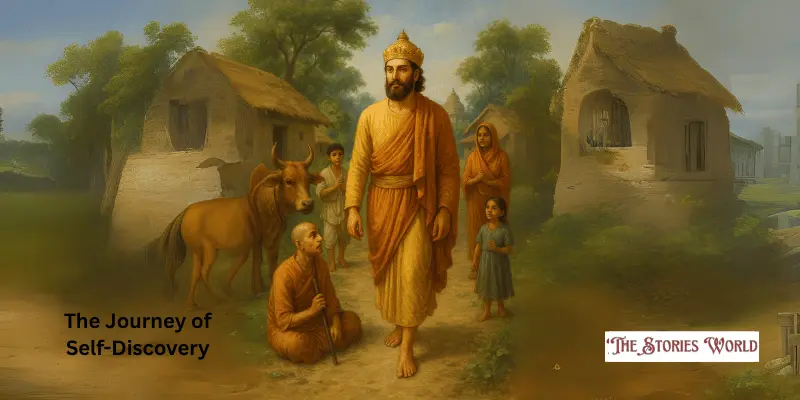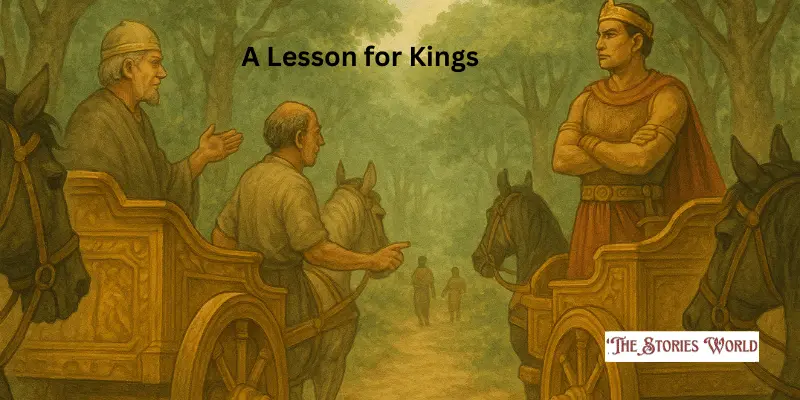The Story About a Lesson for Kings in English and Hindi
Updated: 16 May, 2025
282
“A Lesson for Kings” is a wise and inspiring story about King Brahma-Datta, a noble ruler who seeks honest feedback about his rule.
In his journey, he meets another powerful king, and through a simple yet meaningful encounter on a narrow path.
Both kings learn that true greatness lies not in power but in humility, truth, and moral strength. This tale teaches the timeless value of good character and respectful leadership.
Note
In this post, we’ve included two versions of the story “A Lesson for Kings” — one in English and the other in Hindi.
This makes it easier for readers of both languages to enjoy and understand the powerful message of this timeless tale.
The Story About a Lesson for Kings in English – Let’s Read
In the heart of ancient India, where wisdom was revered more than wealth, there once lived a king named Brahma-Datta, ruler of the grand city of Benares.
His rule was admired far and wide for being just, compassionate, and rooted in dharma (righteous conduct).
His court was a symbol of fairness; peasants and nobles alike came to seek solutions for their disputes, and all left with their hearts satisfied.
Yet even a wise king can be troubled when the path of virtue seems to walk in silence.
And so began a tale that would teach not just a king, but generations to come, the value of humility, introspection, and true leadership.
The Concern of a Righteous King
Years passed under King Brahma-Datta’s peaceful reign, and slowly, he noticed a strange pattern — people no longer came to his court with their problems.
There were no cases to hear, no conflicts to settle.
While his ministers praised this as a sign of his perfect governance, the king was not convinced. “Even the best of men have faults,” he mused. “Why then do my people speak only in praise?”
He began to suspect that the silence was not a sign of perfection, but of fear or hesitation among his subjects.
Determined to know the truth about himself and his rule, Brahma-Datta made a public proclamation, inviting his people to come forward and speak honestly about his flaws — if any existed.
But to his dismay, every voice was filled with flattery, not feedback. The king, honest to the core, refused to be comforted by empty praise.
The Journey of Self-Discovery

Realizing that he could no longer judge himself from within the echo chamber of his court, Brahma-Datta made a bold decision.
He delegated his royal duties to his ministers and set off on a journey across the kingdoms, dressed as a common traveler.
His purpose was not war or diplomacy, but something far rarer among kings: self-examination.
He visited forests, villages, and marketplaces, listening to the thoughts of commoners and sages. Yet, wherever he went, people seemed unwilling to criticize a king — even in disguise.
One afternoon, while journeying through the borders of the Kosala kingdom, Brahma-Datta’s path converged with another regal figure — King Mallika, a powerful monarch renowned for his military conquests and strategic brilliance.
The Chariots Meet on a Narrow Path
The forest path they were on narrowed suddenly, allowing only one chariot to pass.
Both kings, unaware of each other’s identities at first, remained still, expecting the other to give way. Neither charioteer moved.
What followed was not a clash of weapons but of wisdom.
Mallika’s charioteer proudly claimed, “My king is the mightiest in battle, feared by enemies, and unmatched in strategy. It is only right that your chariot step aside.”
But Brahma-Datta’s charioteer, calm and respectful, responded, “My king is not just mighty in war, but greater in virtue.
He speaks the truth, gives generously, is slow to anger, and rules with a calm, peaceful heart. His strength lies not in the sword, but in the soul.”
Recognition and Humility
King Mallika, hearing this humble and profound description, stepped out of his chariot and bowed.
He realized that true greatness did not lie in expanding borders or defeating rivals, but in mastering one’s ego, ruling justly, and remaining rooted in moral values.
The two kings exchanged words of respect, and Brahma-Datta was honored not for his crown but for his character.
This encounter gave Brahma-Datta the confirmation he had been searching for — not through flattery, but through comparison with another ruler.
And in that moment, he understood that even in silence, the principles of right conduct speak louder than the roar of approval.
Moral of the Story
True leadership is not measured by power, fear, or conquest — but by virtue, humility, and the willingness to grow.
Even the most revered leaders must step down from their thrones now and then to seek honest reflection. For only in knowing ourselves truthfully can we lead others justly.
The Story About a Lesson for Kings in Hindi

प्राचीन भारत की पवित्र भूमि पर, जहाँ ज्ञान को धन से अधिक महत्त्व दिया जाता था, वहाँ एक न्यायप्रिय और विवेकशील राजा रहते थे — राजा ब्रह्मदत्त।
वे बनारस के शक्तिशाली सिंहासन पर विराजमान थे और अपने धर्मनिष्ठ और न्यायपूर्ण शासन के लिए दूर-दूर तक प्रसिद्ध थे। उनकी सभा में आम जनता से लेकर दरबारी तक, सभी निडर होकर न्याय की उम्मीद से आते थे — और संतुष्ट लौटते थे।
परंतु, एक दिन वह शांति राजा के मन में प्रश्न बनकर उभरने लगी — “क्या मैं वास्तव में एक आदर्श शासक हूँ, या लोग मेरी आलोचना करने से डरते हैं?”
एक सजग राजा की चिंता
राजा ब्रह्मदत्त ने वर्षों तक लोगों की समस्याओं को सुलझाया था। लेकिन अब, न तो कोई याचक दरबार में आता, न कोई विवाद उठता। उनके मंत्री इसे शासन की परिपूर्णता का प्रतीक मानते थे, परंतु राजा स्वयं असहज थे।
उन्होंने सोचा, “हर मनुष्य में कोई न कोई दोष होता है, यदि मेरे शासन में कोई त्रुटि नहीं बताई जा रही, तो शायद लोग कुछ कहने से डर रहे हैं।”
राजा ने जनसमूह को आमंत्रित किया और खुलकर अपनी आलोचना करने का आग्रह किया। लेकिन जनता ने केवल उनकी प्रशंसा की, किसी ने कोई त्रुटि नहीं बताई।
यह देखकर राजा और भी व्यथित हो उठे — क्योंकि वे सच्चे और ईमानदार शासन की तलाश में थे, न कि चाटुकारिता से सजे सिंहासन की।
आत्म-चिंतन की यात्रा
तब राजा ब्रह्मदत्त ने एक कठिन निर्णय लिया। उन्होंने अपना राज्य अपने मंत्रियों को सौंपा और एक सामान्य यात्री के वेश में आत्म-परीक्षण की यात्रा पर निकल पड़े।
वे गाँवों, जंगलों, और अन्य राज्यों में घूमे, साधुओं से मिले, आम जन की बातें सुनीं — परंतु कहीं भी कोई उन्हें उनके दोषों से अवगत नहीं करा सका।
एक दिन, उनकी यात्रा उन्हें कोशल राज्य की सीमाओं तक ले आई। वहाँ उन्होंने एक और राजा से सामना किया — राजा मल्लिक, जो वीरता और युद्धनीति के लिए प्रसिद्ध थे।
दो राजाओं की भेंट एक संकरी राह पर
एक घने जंगल के बीच, एक संकरी राह पर दोनों राजाओं के रथ आमने-सामने आ गए। रास्ता इतना तंग था कि केवल एक ही रथ आगे बढ़ सकता था। दोनों चुपचाप खड़े रहे। फिर दोनों रथ सारथियों में बहस शुरू हो गई — कौन पहले रास्ता छोड़ेगा?
राजा मल्लिक के सारथी ने गर्व से कहा, “मेरा राजा शक्तिशाली है, अनेक युद्धों में विजय प्राप्त की है, उसे रास्ता देना आपका कर्तव्य है।”
ब्रह्मदत्त के सारथी ने शांत स्वर में उत्तर दिया, “मेरा राजा न केवल युद्ध में, बल्कि आचरण में भी श्रेष्ठ है। वह सत्य बोलते हैं, दान करते हैं, क्रोध से दूर रहते हैं और हर समय धर्म के मार्ग पर चलते हैं। उनका बल बाहरी नहीं, भीतर से आता है।”
सम्मान और आत्म-स्वीकृति
राजा मल्लिक यह सुनकर चौंक गए। उन्होंने महसूस किया कि सच्चा महान वही है जो अपने अहंकार पर विजय पाता है, जो बिना गर्व के धर्म का पालन करता है। उन्होंने तुरंत अपने रथ को पीछे हटाया और राजा ब्रह्मदत्त का सम्मान किया।
इस घटना ने ब्रह्मदत्त को वह उत्तर दे दिया जिसकी उन्हें तलाश थी — न चाटुकारों से, न दरबारियों से, बल्कि एक अन्य राजा की दृष्टि से, जो यह समझ सका कि नैतिकता बल से अधिक शक्तिशाली होती है।
कहानी से सीख
सच्चा नेतृत्व केवल शक्ति या डर से नहीं चलता — बल्कि विनम्रता, आत्मनिरीक्षण और सद्गुणों से होता है। एक सच्चा शासक वही होता है जो अपने दोषों को पहचानने के लिए तैयार हो, और दूसरों से सीखने की क्षमता रखता हो। सिंहासन पर बैठना आसान है, लेकिन धर्म के मार्ग पर अडिग रहना ही राजा को महान बनाता है।
What Kids Can Learn from the Story “A Lesson for Kings”
- True Strength Comes from Kindness and Goodness: The story teaches us that real strength is not just about winning fights or being the biggest — it’s about being kind, honest, and fair. King Brahma-Datta was respected because he was calm, truthful, and cared about doing what was right.
- Always Be Willing to Learn: Even though King Brahma-Datta was already a great ruler, he still wanted to learn and grow. He wasn’t afraid to ask others if he was doing something wrong. That shows us how important it is to keep learning, even when we’re doing well.
- Respect Others, Even If You Are Powerful: King Mallika learned to respect King Brahma-Datta not because of his army or power, but because of his wisdom and goodness. This teaches us that we should respect people not for how strong they are, but for how good they are inside.
- Don’t Be Afraid of the Truth: Sometimes, it’s hard to hear what we might be doing wrong. But being brave enough to listen and improve makes us better people. King Brahma-Datta was not afraid of the truth — he went looking for it.
- Good Behavior Is More Important Than Being Famous: Being famous or powerful doesn’t mean you’re a good person. What matters is how you treat others, how honest you are, and how you lead by example.
Follow-Questions For This Story
| Follow Up Questions |
|---|
|
Please Write Your Comments